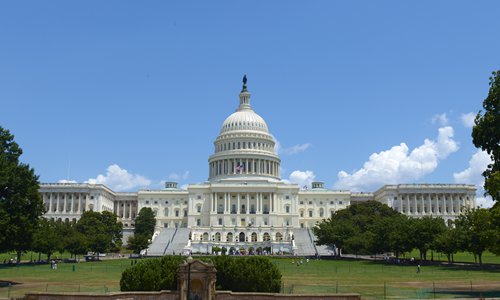HOME >> OPINION
US hysteria and pervasive Red Scare
By Clifford A. Kiracofe Source:Global Times Published: 2019/7/31 22:18:40

Photo: VCG
Washington seems to be in the grip of a new Red Scare these days that is damaging US-China relations. It will not be easy to repair that damage with or without a Red Scare.
US policy toward China moved from former US president Barack Obama's pivot to President Donald Trump's trade and tech war to today's Red Scare. US elites, presiding over a US in relative decline, appear to be ever more hysterical and blame foreigners, instead of themselves, for US problems.
Blaming foreigners for domestic ills feeds a blind populism that US politicians cynically manipulate. It has reached the disgraceful point today where elected members of Congress whose families recently came to the US are told to "go back home." For a nation of immigrants, this would seem out of place in normal times. But the times are not normal in the US.
The first Red Scare began in the 1920s when Soviet Communism was seen as penetrating the US. The second Red Scare occurred during the 1950s when US Senator Joseph McCarthy launched into tirades against supposed Soviet penetration of the US federal government in Washington.
The current Red Scare involves accusations against China involving everything from tech and espionage to Chinese students and professors.
So why is there a new Red Scare?
US hegemonism blinds ruling elites, who have a deep fear of losing global dominance in the emerging multipolar world. This fear explains the increasing hysteria in the US Congress and in the White House directed not only against China but also against Russia and Iran these days.
Rather than adjusting to the emerging multipolar international environment, Washington doubles down on its policy of imperialism and attempts to maintain hegemony. The US should recognize a changing world and that it is only through constructive diplomacy and honest competition can the US make its way.
For decades, the US has used its power to drag the world into an international system locked into finance capitalism. But today there are other development models and they have a right to coexist. The US rejects such coexistence which is the reason why Washington uses the trade and tech war against China's model in order to change it.
Alternative development models such as Europe's social market or China's socialism with Chinese characteristics are perceived to threaten Washington's ability to impose Wall Street-friendly finance capitalism. At the same time, China's rapid modernization, based on intensive scientific research and innovative technology, not to mention plain hard work, displaces the US which is in relative socioeconomic decline.
What about China-US relations?
It will not be easy for China, or the international community for that matter, to manage relations with a US in relative decline. The US, for example, is plagued by poverty, the destruction of the middle class, racial tensions, political polarization, drug addiction, public health issues, diminished science-tech-engineering-math capability, disintegrating infrastructure and lack of skilled labor.
The fixed hegemonic objective of US foreign policy suggests that Washington will have increasing difficulty in maintaining its position amid a changing international situation. International relations theory, not to mention history, indicates that other countries will offset an imperial power through cooperation.
US hegemonism is a bipartisan policy. Hubris and narcissism poison the ruling elites. Obama began the pivot using military and diplomatic tools to "rebalance" against China. Trump continues that but adds economic and information war tools.
US-China relations cannot be expected to improve significantly until the US elites change their hegemonic and Cold War mind-set and undertake a new constructive foreign policy and national strategy adapted to a complex multipolar world.
The increasing hysteria and lack of confidence in Washington leads to a vindictive policy and lashing out at the world. Calm reflection about US capabilities and policy goals, means and ends, is hardly possible.
Washington must focus narrowly and prudently on national interest, not on hegemony, global crusades, and unnecessary military adventures. Washington has made a mess of relations with China and must now rethink a way forward.
The author is an educator and former senior professional staff member of the Senate Committee on Foreign Relations. opinion@globaltimes.com.cn
Posted in: VIEWPOINT